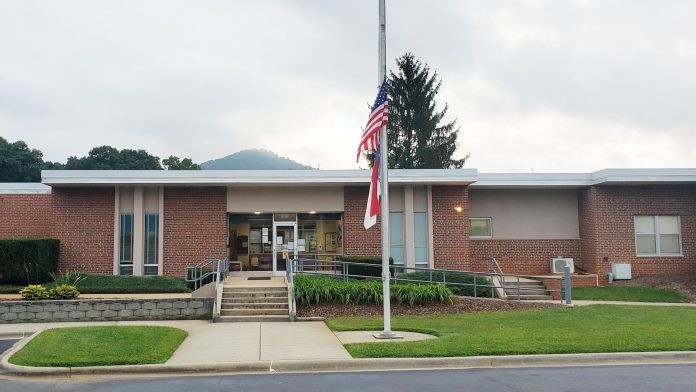Julian F. Keith Alcohol and Drug Abuse Treatment Center
201 Tabernacle Rd
Black Mountain, NC 28711

About Julian F. Keith Alcohol and Drug Abuse Treatment Center
The Julian F Keith alcohol and drug abuse treatment center helps adults with substance abuse issues. You’ll find ‘em out in Black Mountain, North Carolina . They have inpatient and outpatient programs available, depending on the individual recovery needs and goals.
They have medically monitored detox services in their acute care unit to keep guests comfortable. The interdisciplinary team supervises detox for safety and also helps stabilize guests with co-occurring mental health conditions.
The inpatient program allows guests to focus on healing without worrying about outside distractions. These services include a structured environment conducive to recovery. The rigorous schedule includes a full day of therapy groups where you can share addiction challenges with others in recovery and receive feedback that may be helpful for your journey.
Inpatient classes help with educational resources where you may learn more about the disease of addiction and how it can affect your health and relationships. Discharge planning includes referrals for ongoing treatment with other agencies and health providers. They may recommend outpatient care for continued support.
Their outpatient services are appropriate for those who want to live at home and continue with regular activities like working or attending school. It’s also best for those who have a supportive network at home.
The program includes peer support specialists who are in recovery and can offer support and connections to tools and resources needed for sobriety. Peers can help guide you through the program so that you receive the most benefit and assistance. They’ll share their struggles and experiences with you and provide community connections for more support.
Peers can also help with transportation, employment opportunities, food, clothing, and other necessities. This service can be especially helpful in the beginning phases of recovery. These services are available for up to 30 days after discharge. Referrals for treatment are made through your Local Management Entities/Managed Care Organization or community provider.
Amenities
Residential drug rehab provides the comforts of home with the therapeutic support needed to successfully recover. Benefits of an inpatient program include increased safety, a higher success rate, and the time and distance given to focus on recovery. Residential drug rehabs are often the preferred method of treatment, as they can be tailored to meet specific needs, offer focused therapeutic care, and provide the necessary tools to sustain recovery.
Recreational therapy uniquely combines therapeutic interventions with an activity, like horse-riding, hiking, wilderness therapy, basketball, tennis, or a full workout. Benefits of recreational therapy include providing a healthy way to work through the emotions of recovery, learning to build and maintain relationships, improving communication skills, and building self-esteem.
Addiction Treatment Programs
When individuals participate in a young adult program in North Carolina, they feel more at ease in a setting that is age-appropriate. Activities, therapies, and aesthetics are all tailored for this age group, so participants can feel comfortable and are more likely to complete the program.
An adult program in North Carolina typically combines individual and group counseling, medical treatment, and various other therapies to treat substance use disorders. Treatment can take place in an inpatient or outpatient setting.
Alcohol rehab in North Carolina is a course of treatments that helps participants overcome alcohol dependency. Treatments address physical, mental, and emotional aspects of substance use disorder and help the individual develop healthy habits for long-term recovery.
To overcome opioid addiction, attend opioid rehab in North Carolina. Treatment takes place in inpatient or outpatient care, using a variety of therapies, medications, and other helpful interventions. Length of treatment caries, typically lasting 30, 60, or 90 days.
There are many types of drug rehab in North Carolina. To receive treatment for addiction, you can choose from many inpatient and outpatient programs. Often, participants start with detox and work through a full continuum of care that continues with ongoing support for long-term recovery.
Elderly rehab in North Carolina provides specialized treatment for addiction among adults ages 55 and older or 65 and older. This treatment typically addresses dual diagnosis, substance use disorder, and age-specific concerns of seniors.
Veteran’s rehab in North Carolina offers trauma-informed therapy from experienced mental health professionals. These programs offer a supportive and understanding environment to help Veterans recover from substance use disorders and manage co-occurring conditions.
The goal of rational emotive behavioral therapy in North Carolina is to help you develop healthy emotional, behavioral, and cognitive patterns so you can increase your quality of life and achieve sobriety goals. This is accomplished by increasing healthy, rational beliefs.
Moral Reconation Therapy (MRT) is a form of psychotherapy commonly used in addiction recovery. Based on cognitive behavioral therapy (CBT), moral reconation therapy (MRT) helps clients recognize unhealthy and/or harmful thought patterns and to replace them with more positive and productive ones. MRT is designed to empower clients to make healthier life choices and to more effectively align their behaviors with their moral values.
Levels of Care
Some of the most common co-occurring mental health disorders include anxiety, depression, and eating disorders. When these are present alongside substance use disorder, dual diagnosis treatment in North Carolina is necessary to address both conditions.
When you choose inpatient drug rehab in North Carolina, you’ll live at a rehab facility for 28 to 90 days, depending on the program. Typical methods of treatment include group and individual therapy and family counseling.
Nearly all drug rehabs in North Carolina begin with a detox program. When this process is complete, all addictive substances will be purged from your body. You can then move on to the next steps of drug rehab in North Carolina.
Many people find that a few months in North Carolina sober living after rehab treatment gives them a good foundation for long-term recovery. The average stay at a sober living home is five to eight months, but you get to decide when you are ready to live on your own.
Recovery journeys often begin with intervention services in North Carolina. This treatment tool provides key support in planning and facilitating an effective intervention. Intervention specialists can also provide resources to develop treatment plans and guide families through the admission process.
Outpatient rehab in North Carolina is often the next step for those who complete an inpatient program. This less restrictive treatment involves several hours of therapy per week, and accountability through 12-step meetings such as AA. You’ll continue this treatment as long as needed, which could be weeks, months, or years.
Accreditations
Contact Information
Nearby Treatment Centers

741 Old US Highway 70
Swannanoa, NC 28778

201 Tabernacle Rd
Black Mountain, NC 28711

932 Old US Highway 70
2nd Floor, Moore II
Black Mountain, NC 28711

2706 US-70
Swannanoa, NC 28778